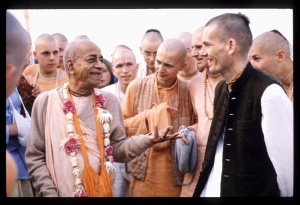SB 7.1.35

A.C. Bhaktivedanta Swami Prabhupada
TEXT 35
- dehendriyāsu-hīnānāṁ
- vaikuṇṭha-pura-vāsinām
- deha-sambandha-sambaddham
- etad ākhyātum arhasi
SYNONYMS
deha — of a material body; indriya — material senses; asu — life breath; hīnānām — of those devoid; vaikuṇṭha-pura — of Vaikuṇṭha; vāsinām — of the residents; deha-sambandha — in a material body; sambaddham — bondage; etat — this; ākhyātum arhasi — please describe.
TRANSLATION
The bodies of the inhabitants of Vaikuṇṭha are completely spiritual, having nothing to do with the material body, senses or life air. Therefore, kindly explain how associates of the Personality of Godhead were cursed to descend in material bodies like ordinary persons.
PURPORT
This very significant question would be difficult for an ordinary person to answer, but Nārada Muni, being an authority, could answer it. Therefore Mahārāja Yudhiṣṭhira inquired from him, saying, etad ākhyātum arhasi: "only you can explain the reason." From authoritative sources it can be discerned that associates of Lord Viṣṇu who descend from Vaikuṇṭha do not actually fall. They come with the purpose of fulfilling the desire of the Lord, and their descent to this material world is comparable to that of the Lord. The Lord comes to this material world through the agency of His internal potency, and similarly, when a devotee or associate of the Lord descends to this material world, he does so through the action of the spiritual energy. Any pastime conducted by the Supreme Personality of Godhead is an arrangement by yogamāyā, not mahāmāyā. Therefore it is to be understood that when Jaya and Vijaya descended to this material world, they came because there was something to be done for the Supreme Personality of Godhead. Otherwise it is a fact that no one falls from Vaikuṇṭha.
Of course, a living entity who desires sāyujya-mukti remains in Kṛṣṇa's Brahman effulgence, which is dependent on Kṛṣṇa's body (brahmaṇo hi pratiṣṭhāham (BG 14.27)). Such an impersonalist who takes shelter of the Brahman effulgence must surely fall down. This is stated in the śāstra (SB 10.2.32):
- ye 'nye 'ravindākṣa vimukta-māninas
- tvayy asta-bhāvād aviśuddha-buddhayaḥ
- āruhya kṛcchreṇa paraṁ padaṁ tataḥ
- patanty adho 'nādṛta-yuṣmad-aṅghrayaḥ
"O Lord, the intelligence of those who think themselves liberated but who have no devotion is impure. Even though they rise to the highest point of liberation by dint of severe penances and austerities, they are sure to fall down again into material existence, for they do not take shelter at Your lotus feet." The impersonalists cannot reach the Vaikuṇṭha planets to become associates of the Lord, and therefore, according to their desires, Kṛṣṇa gives them sāyujya-mukti. However, since sāyujya-mukti is partial mukti, they must fall again to this material world. When it is said that the individual soul falls from Brahmaloka, this applies to the impersonalist.
From authoritative sources it is learned that Jaya and Vijaya were sent to this material world to fulfill the Lord's desire to fight. The Lord also sometimes wants to fight, but who can fight with the Lord but a very confidential devotee of the Lord? Jaya and Vijaya descended to this world to fulfill the Lord's desire. Therefore in each of their three births—first as Hiraṇyākṣa and Hiraṇyakaśipu, second as Rāvaṇa and Kumbhakarṇa, and third as Śiśupāla and Dantavakra—the Lord personally killed them. In other words, these associates of the Lord, Jaya and Vijaya, descended to the material world to serve the Lord by fulfilling His desire to fight. Otherwise, as Mahārāja Yudhiṣṭhira says, aśraddheya ivābhāti: the statement that a servant of the Lord could fall from Vaikuṇṭha seems unbelievable. How Jaya and Vijaya came to this material world is explained by Nārada Muni as follows.